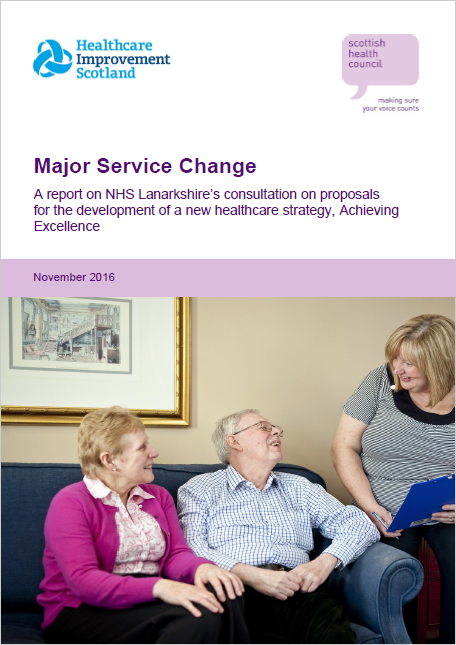Major service change reports
The guidance followed in publishing this report has since been superseded by Planning with People guidance
NHS Lanarkshire's consultation on proposals for the development of a new healthcare strategy, "Achieving Excellence"
This report sets out our assessment of whether NHS Lanarkshire's engagement and consultation process for the development of a new healthcare strategy, Achieving Excellence, followed Scottish Government guidance, which requires that NHS boards seek, listen to and act on the views of potentially affected people and communities when proposing changes to services.
Based on the evidence outlined in this report, our view is that NHS Lanarkshire has followed the national guidance set out by the Scottish Government.
It is our view that:
- The specialty specific reviews are at an earlier stage in their development and further engagement should be undertaken to refine proposals and seek views from patients, carers and the public as appropriate.
- Patient and public representatives should continue to be actively engaged in the various elements of the capital investment programme for the redevelopment of Monklands Hospital.
Recommendations
- A number of practical challenges were identified with the Centre of Excellence model, for example transport and travel, access and continuity of care. We suggest an equality impact assessment be undertaken on the Centre of Excellence generic model, which may then be adapted for appropriate specialties.
- In response to concerns that shifting the balance of care from the acute setting to the community may not be sufficiently resourced, NHS Lanarkshire and the Health and Social Care Partnerships may consider how workforce and financial arrangements are made visible to the public to provide assurance around quality of care and sustainability of emerging models.
- Our survey identified that a number of people were unsure about next steps in the consultation process. NHS Lanarkshire has undertaken to provide further clarity on how a decision will be made on developments and timescales.
- Further engagement with patient and public representatives should be undertaken, as appropriate, to take forward the plans for orthopaedics and redevelopment of Monklands.
Areas of good practice we identified
- Pre-meeting and briefing papers in advance of orthopaedic option development and appraisal events to support people’s understanding and enable them to participate in the process in a meaningful way.
- Development of a healthcare strategy engagement leaflet to initiate a level of understanding and discussion with a wider group of people and to provide an opportunity for comment at a formative stage in the process.
- Range of methods and approaches used to share information and maintain momentum for participation during the consultation process.
- Approaches used to support a more inclusive process for example Easy Read version of the consultation document, signers in attendance at all public meetings and use of short films.
- Flexibility during the consultation to respond to requests for further meetings and to meet the information needs of people at the meetings.
- The format of the public meetings supported all people to participate in smaller groups and was more accessible to those with sensory impairment.
- Attendance by the Chief Executive, senior management and Non-Executive Directors at the 5 public meetings demonstrated the importance they attached to Achieving Excellence and a willingness to hear people's views at first hand to help inform their decision-making.
- Use of health and social care networks and events to cascade information and develop shared
understanding.
Learning points for future processes
The learning points to emerge from this process should be taken into account by NHS Lanarkshire for future service change. These include the following:
- We note that NHS Lanarkshire took the decision based on urgent clinical reasons for implementing the interim orthopaedic model. It is important that this approach is taken as an exception and that the process outlined in the guidance is followed as the norm. We are aware there are occasions when there is a need to develop interim models to ensure safe and sustainable services. It is important that when steps are taken to put in place urgent changes for safety reasons, the board is able to demonstrate this is because of deteriorating circumstances and that such arrangements do not, in any way, pre-empt or pre-judge permanent changes. This is important to ensure that members of the public are not, and do not feel, disempowered.
- NHS Lanarkshire used the word 'interim' to describe the first phase in its approach to deliver an orthopaedic service. Some people understood 'interim' to mean temporary until the outcome of the consultation was agreed. We recommend that in future when NHS boards are putting into place temporary arrangements, pending an engagement and consultation process and formal decision, this should be described as 'temporary' to support full engagement in the process.
- Many respondents referred to a lack of clarity and detail in the consultation documents around the practical aspects of implementing care within the community setting – we understand some of this detail may not yet be developed but this feedback should be considered and addressed as work progresses.
- To avoid any suggestion of tokenism, always ensure that sufficient time is allowed during open events for questions from the floor, and for responses to be given.
- Although NHS Lanarkshire clearly described the drivers for change and scope of the consultation, it was not clear how feedback would be collated and used to inform the next steps.
- Consider additional locations where consultation material may be more visible and widely available.

